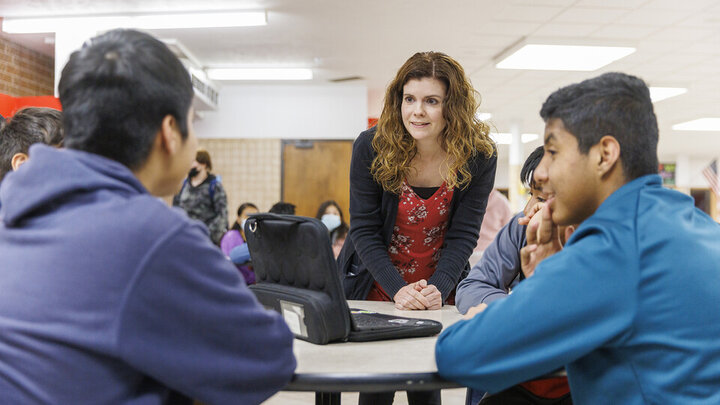Every morning at Crete Middle School, school psychologist Katie Bevins walks the commons area and visits with students utilizing the space to eat breakfast, chat with friends, or study a bit more before classes begin.
These interactions play a crucial role for Bevins in building trust and relationships with them, because like all school psychologists, she will be one of the first called on to help if a student is struggling with mental or behavioral health or facing a crisis.
“Kids are themselves at school, and I think we get a unique view of what kids are facing,” said Bevins, an alumna of the University of Nebraska–Lincoln’s school psychology program. “A lot of kids who need help end up getting it in a school setting, because they’re here, and we can provide some of those services. School psychologists have a unique perspective and training on how to support kids in the school environment — in both learning and mental and behavioral health.”
School psychologists play many roles, and their training reflects that, said Catelyn Kenney, who works at Lincoln Public Schools and is also a Husker alumna.
“We’re often the only one in the building with expertise in managing behavior, understanding classroom climates, understanding interventions for behavior and academics,” Kenney, a school psychologist, said. “We have expertise to work with individual students, but we’re also able to take a step back and be experts in data analysis to evaluate systems and form best practices.”
Despite their importance, which was magnified by the COVID-19 pandemic, school psychologists are in short supply. In Nebraska, and across the United States, many positions consistently go unfilled, leaving a segment of students underserved. In Nebraska, more than 47,000 children have been diagnosed with behavioral or mental health conditions, according to the 2020 Kids Count in Nebraska report, and these students often rely on support from school psychologists.
“Approximately 20 to 22% of children and adolescents have one or more mental health disorders recognized by the American Psychiatric Association. Community providers — hospitals and clinics — are meeting the needs of only about a fourth of those, so the majority of children with mental health needs are receiving services through schools,” said Beth Doll, professor of school psychology and director of the Nebraska Internship Consortium in Professional Psychology. “For the past 25 years or so, schools have been the primary provider of mental health services, so it’s critically important that we have people in schools that understand the mental health needs of students.”
The University of Nebraska–Lincoln’s School Psychology program continually helps address these shortages for Nebraska and beyond through its practice-centered curriculum that provides three-year and six-year training programs for educational specialist and doctoral degrees, respectively. Considered one of the best training programs in the United States, Nebraska’s school psychology program is accredited by both the American Psychological Association and the National Association of School Psychologists, and typically graduates about 10 students each year.
“The School Psychology program at UNL has made a big impact on mental health service delivery in the state of Nebraska,” said Susan Swearer, Willa Cather professor and chair of the Department of Educational Psychology . “The program at Nebraska attracts students from across the United States who come here to study and train, and then often stay.”
In addition to the school psychology program, the university in 1985 established the Nebraska Internship Consortium in Professional Psychology. The consortium is comprised of eight institutions in Nebraska with training opportunities in both in-patient and outpatient settings and offers accredited internships each year to around 40 students enrolled in clinical, counseling and school psychology training programs throughout the United States. It is the largest APA-approved internship training program in the United States.
“An internship has to be accredited nationally for someone to qualify for a license, and the problem we were having nationwide, and certainly in Nebraska, is that there weren’t enough accredited internships available,” Doll said. “One of our faculty established the consortium, which offered internships that were accredited by the American Psychological Association.”
The consortium has been instrumental in bringing mental health professionals to the state. In 2018 and 2019, only 9 to 10% of those who interned with the consortium were native to Nebraska, but 19% and 34%, respectively, stayed and became licensed providers in the state following completion of their degree.
“With the numbers of our graduates from the program and from the consortium who stay, we significantly contribute to the workforce development of mental health professionals in Nebraska,” Swearer said.
Faculty and alumni of the school psychology program are also working with state lawmakers to address the shortage. State Sen. Jen Day, of District 49, sponsored LR213 in 2021, which established an interim study of the mental and behavioral health needs of Nebraska students. The report was completed and submitted to the Legislature in January 2022 by the Nebraska School Psychologists Association, in which faculty and alumni, including Bevins, have leadership positions. The report demonstrated the ongoing — and growing — need for mental health professionals in schools, and laid out ways the state could help through programs such as tuition aid. Day plans on introducing legislation based on the report to address these needs.
Doll and her colleague, Matthew Gormley, assistant professor of school psychology, also are developing and seeking funding for a new project that would help train school psychologists in rural Nebraska.
“The shortage I’m most concerned about is the shortage in our rural communities, because they do have a harder time getting candidates for those positions,” Doll said. “We’re working on a grant and developing ways to make it possible that they can receive the training in school psychology where they are. We want to identify those folks in our rural districts who would love to be a school psychologist, but have not been able to do it without leaving their home or family.”
College of Education and Human Sciences
Educational Psychology




